Preparing for Professional Transitions in MSN Nursing Program
VerifiedAdded on 2020/02/19
|5
|1066
|193
Essay
AI Summary
This essay, written by a student in an MSN program, explores the critical aspects of preparing for professional transitions into a nurse leader-manager role. The author reflects on the challenges and necessary skills for success, particularly focusing on developing critical thinking and responsive leadership communication. The essay highlights the importance of these skills in managing healthcare units, ensuring patient safety, and fostering effective teamwork within interdisciplinary healthcare teams. The author details personal growth and strategies to improve, including seeking feedback, practicing active listening, and demonstrating empathy. The essay references key literature and provides insights into the practical application of leadership principles within the healthcare environment.
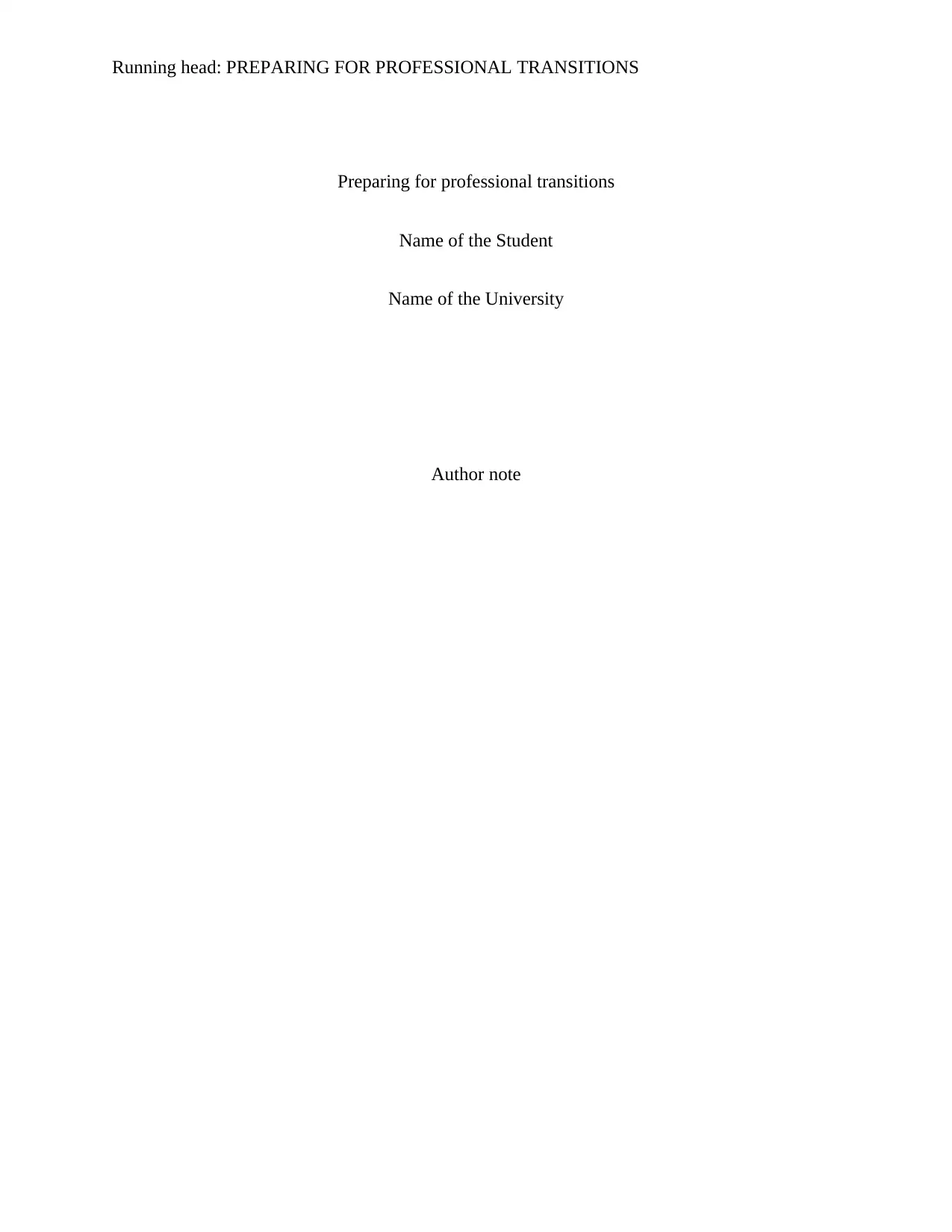
Running head: PREPARING FOR PROFESSIONAL TRANSITIONS
Preparing for professional transitions
Name of the Student
Name of the University
Author note
Preparing for professional transitions
Name of the Student
Name of the University
Author note
Paraphrase This Document
Need a fresh take? Get an instant paraphrase of this document with our AI Paraphraser
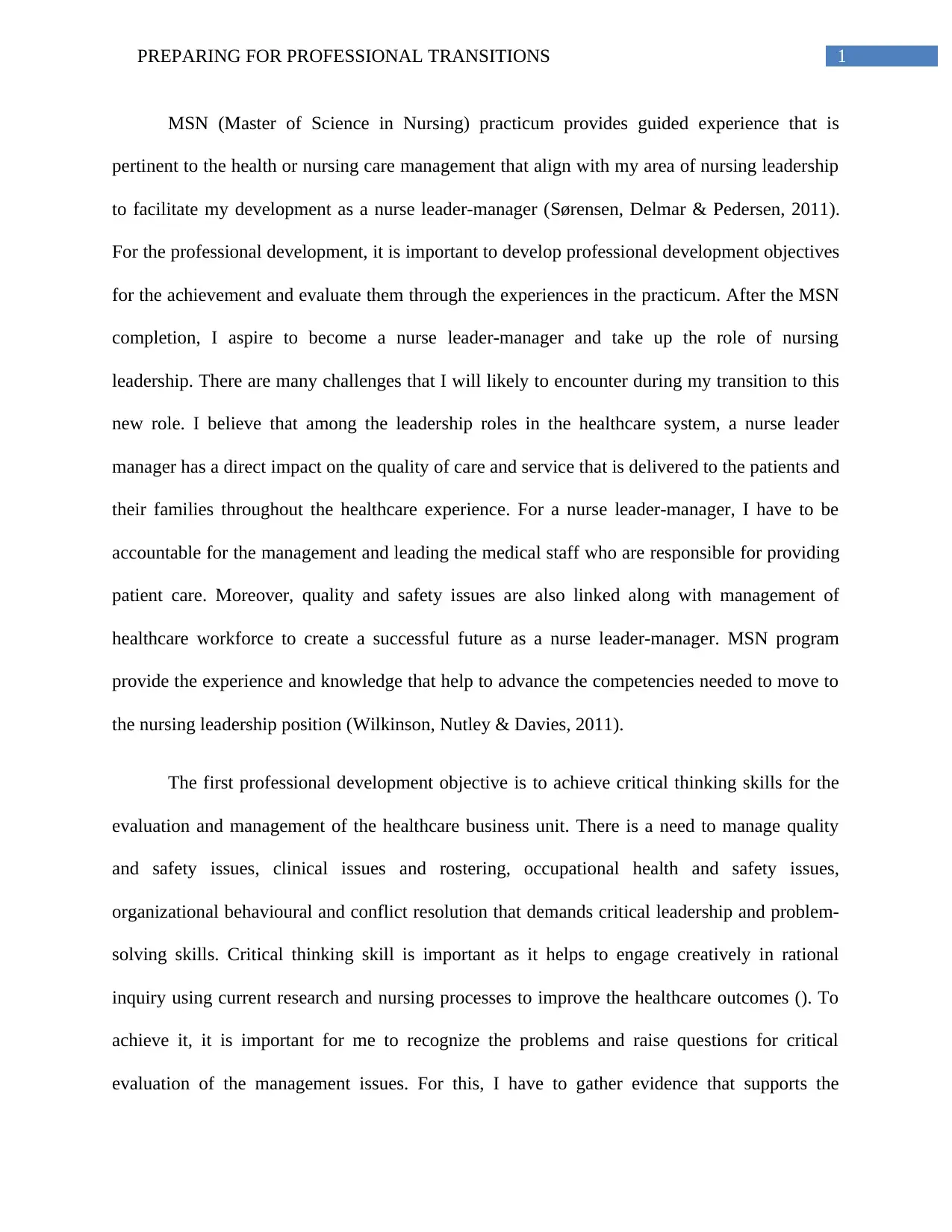
1PREPARING FOR PROFESSIONAL TRANSITIONS
MSN (Master of Science in Nursing) practicum provides guided experience that is
pertinent to the health or nursing care management that align with my area of nursing leadership
to facilitate my development as a nurse leader-manager (Sørensen, Delmar & Pedersen, 2011).
For the professional development, it is important to develop professional development objectives
for the achievement and evaluate them through the experiences in the practicum. After the MSN
completion, I aspire to become a nurse leader-manager and take up the role of nursing
leadership. There are many challenges that I will likely to encounter during my transition to this
new role. I believe that among the leadership roles in the healthcare system, a nurse leader
manager has a direct impact on the quality of care and service that is delivered to the patients and
their families throughout the healthcare experience. For a nurse leader-manager, I have to be
accountable for the management and leading the medical staff who are responsible for providing
patient care. Moreover, quality and safety issues are also linked along with management of
healthcare workforce to create a successful future as a nurse leader-manager. MSN program
provide the experience and knowledge that help to advance the competencies needed to move to
the nursing leadership position (Wilkinson, Nutley & Davies, 2011).
The first professional development objective is to achieve critical thinking skills for the
evaluation and management of the healthcare business unit. There is a need to manage quality
and safety issues, clinical issues and rostering, occupational health and safety issues,
organizational behavioural and conflict resolution that demands critical leadership and problem-
solving skills. Critical thinking skill is important as it helps to engage creatively in rational
inquiry using current research and nursing processes to improve the healthcare outcomes (). To
achieve it, it is important for me to recognize the problems and raise questions for critical
evaluation of the management issues. For this, I have to gather evidence that supports the
MSN (Master of Science in Nursing) practicum provides guided experience that is
pertinent to the health or nursing care management that align with my area of nursing leadership
to facilitate my development as a nurse leader-manager (Sørensen, Delmar & Pedersen, 2011).
For the professional development, it is important to develop professional development objectives
for the achievement and evaluate them through the experiences in the practicum. After the MSN
completion, I aspire to become a nurse leader-manager and take up the role of nursing
leadership. There are many challenges that I will likely to encounter during my transition to this
new role. I believe that among the leadership roles in the healthcare system, a nurse leader
manager has a direct impact on the quality of care and service that is delivered to the patients and
their families throughout the healthcare experience. For a nurse leader-manager, I have to be
accountable for the management and leading the medical staff who are responsible for providing
patient care. Moreover, quality and safety issues are also linked along with management of
healthcare workforce to create a successful future as a nurse leader-manager. MSN program
provide the experience and knowledge that help to advance the competencies needed to move to
the nursing leadership position (Wilkinson, Nutley & Davies, 2011).
The first professional development objective is to achieve critical thinking skills for the
evaluation and management of the healthcare business unit. There is a need to manage quality
and safety issues, clinical issues and rostering, occupational health and safety issues,
organizational behavioural and conflict resolution that demands critical leadership and problem-
solving skills. Critical thinking skill is important as it helps to engage creatively in rational
inquiry using current research and nursing processes to improve the healthcare outcomes (). To
achieve it, it is important for me to recognize the problems and raise questions for critical
evaluation of the management issues. For this, I have to gather evidence that supports the
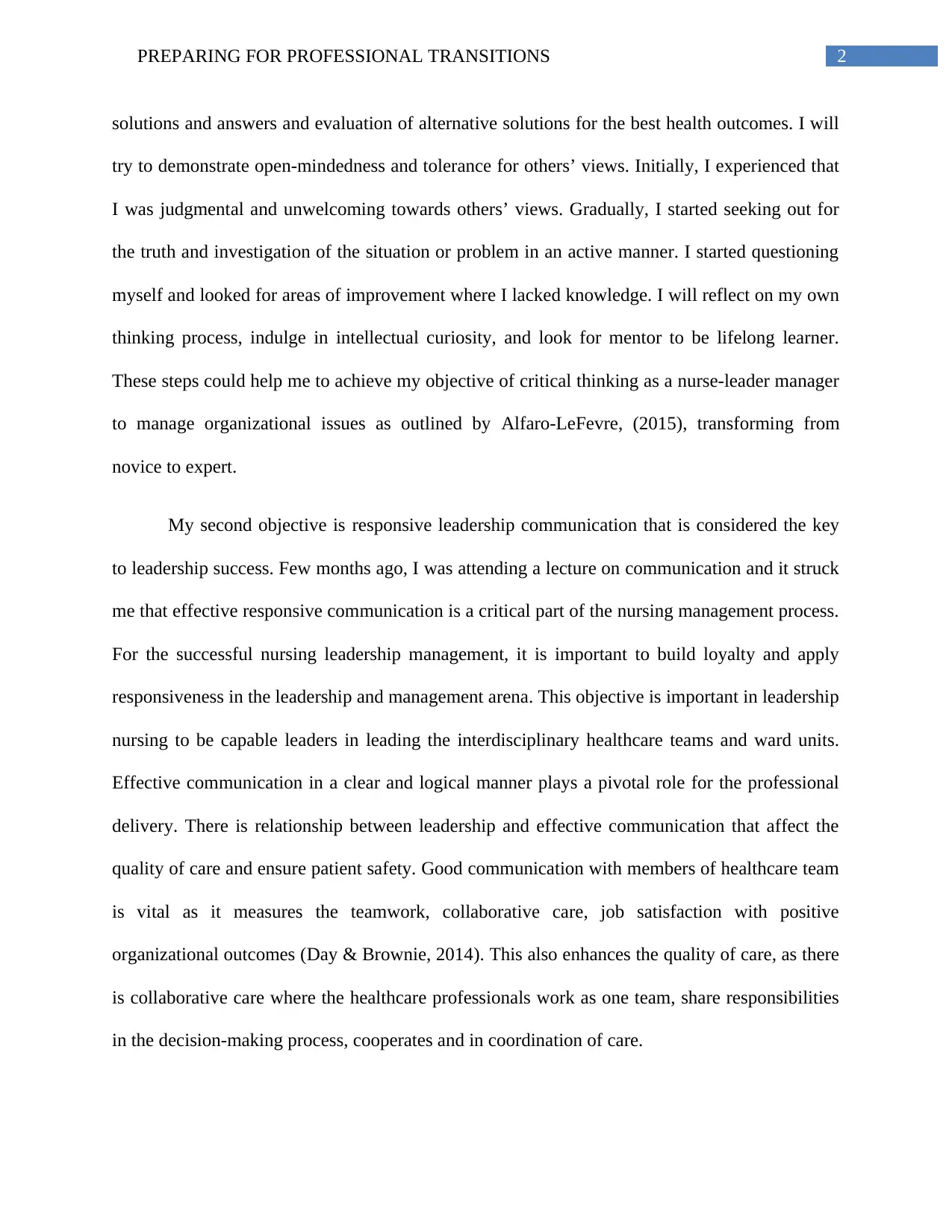
2PREPARING FOR PROFESSIONAL TRANSITIONS
solutions and answers and evaluation of alternative solutions for the best health outcomes. I will
try to demonstrate open-mindedness and tolerance for others’ views. Initially, I experienced that
I was judgmental and unwelcoming towards others’ views. Gradually, I started seeking out for
the truth and investigation of the situation or problem in an active manner. I started questioning
myself and looked for areas of improvement where I lacked knowledge. I will reflect on my own
thinking process, indulge in intellectual curiosity, and look for mentor to be lifelong learner.
These steps could help me to achieve my objective of critical thinking as a nurse-leader manager
to manage organizational issues as outlined by Alfaro-LeFevre, (2015), transforming from
novice to expert.
My second objective is responsive leadership communication that is considered the key
to leadership success. Few months ago, I was attending a lecture on communication and it struck
me that effective responsive communication is a critical part of the nursing management process.
For the successful nursing leadership management, it is important to build loyalty and apply
responsiveness in the leadership and management arena. This objective is important in leadership
nursing to be capable leaders in leading the interdisciplinary healthcare teams and ward units.
Effective communication in a clear and logical manner plays a pivotal role for the professional
delivery. There is relationship between leadership and effective communication that affect the
quality of care and ensure patient safety. Good communication with members of healthcare team
is vital as it measures the teamwork, collaborative care, job satisfaction with positive
organizational outcomes (Day & Brownie, 2014). This also enhances the quality of care, as there
is collaborative care where the healthcare professionals work as one team, share responsibilities
in the decision-making process, cooperates and in coordination of care.
solutions and answers and evaluation of alternative solutions for the best health outcomes. I will
try to demonstrate open-mindedness and tolerance for others’ views. Initially, I experienced that
I was judgmental and unwelcoming towards others’ views. Gradually, I started seeking out for
the truth and investigation of the situation or problem in an active manner. I started questioning
myself and looked for areas of improvement where I lacked knowledge. I will reflect on my own
thinking process, indulge in intellectual curiosity, and look for mentor to be lifelong learner.
These steps could help me to achieve my objective of critical thinking as a nurse-leader manager
to manage organizational issues as outlined by Alfaro-LeFevre, (2015), transforming from
novice to expert.
My second objective is responsive leadership communication that is considered the key
to leadership success. Few months ago, I was attending a lecture on communication and it struck
me that effective responsive communication is a critical part of the nursing management process.
For the successful nursing leadership management, it is important to build loyalty and apply
responsiveness in the leadership and management arena. This objective is important in leadership
nursing to be capable leaders in leading the interdisciplinary healthcare teams and ward units.
Effective communication in a clear and logical manner plays a pivotal role for the professional
delivery. There is relationship between leadership and effective communication that affect the
quality of care and ensure patient safety. Good communication with members of healthcare team
is vital as it measures the teamwork, collaborative care, job satisfaction with positive
organizational outcomes (Day & Brownie, 2014). This also enhances the quality of care, as there
is collaborative care where the healthcare professionals work as one team, share responsibilities
in the decision-making process, cooperates and in coordination of care.
⊘ This is a preview!⊘
Do you want full access?
Subscribe today to unlock all pages.

Trusted by 1+ million students worldwide
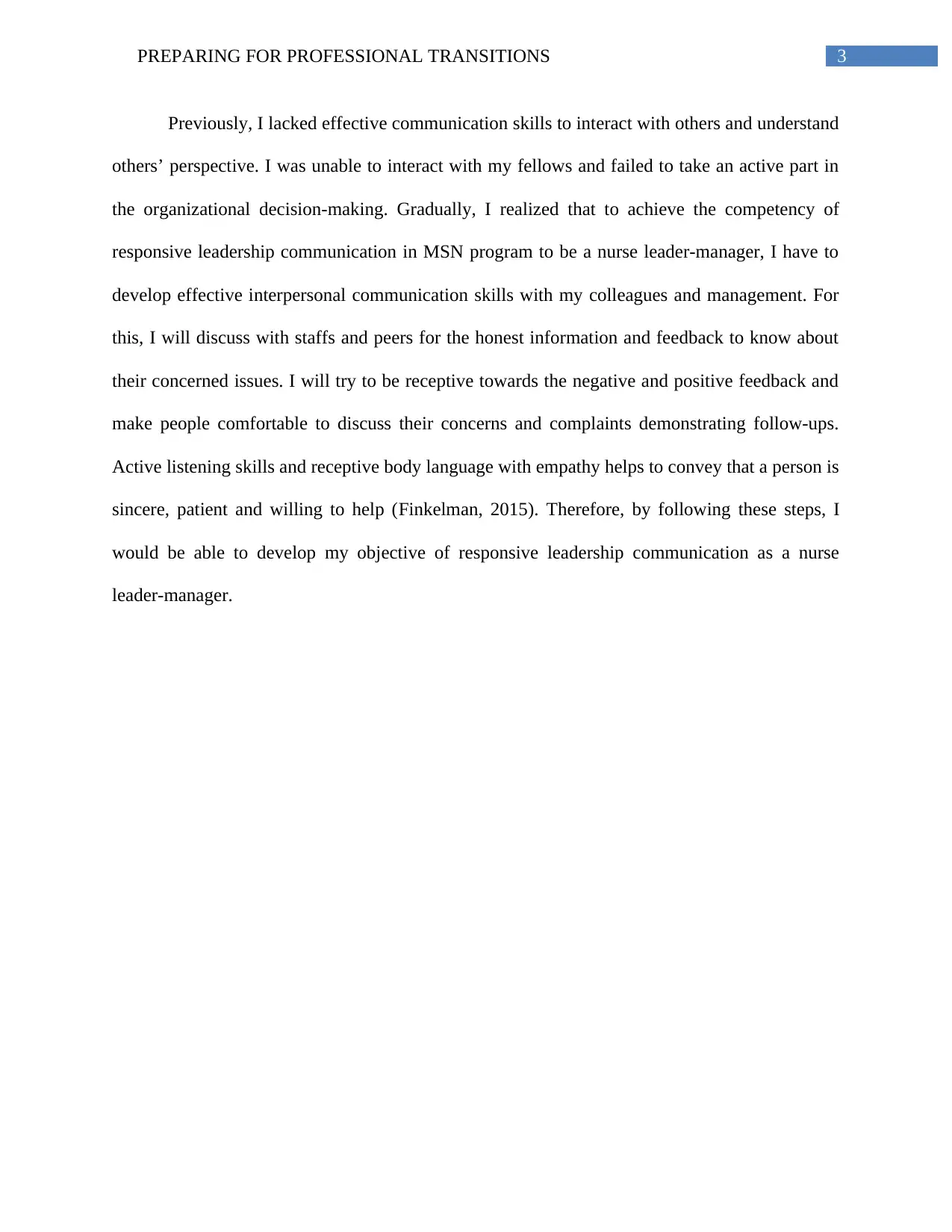
3PREPARING FOR PROFESSIONAL TRANSITIONS
Previously, I lacked effective communication skills to interact with others and understand
others’ perspective. I was unable to interact with my fellows and failed to take an active part in
the organizational decision-making. Gradually, I realized that to achieve the competency of
responsive leadership communication in MSN program to be a nurse leader-manager, I have to
develop effective interpersonal communication skills with my colleagues and management. For
this, I will discuss with staffs and peers for the honest information and feedback to know about
their concerned issues. I will try to be receptive towards the negative and positive feedback and
make people comfortable to discuss their concerns and complaints demonstrating follow-ups.
Active listening skills and receptive body language with empathy helps to convey that a person is
sincere, patient and willing to help (Finkelman, 2015). Therefore, by following these steps, I
would be able to develop my objective of responsive leadership communication as a nurse
leader-manager.
Previously, I lacked effective communication skills to interact with others and understand
others’ perspective. I was unable to interact with my fellows and failed to take an active part in
the organizational decision-making. Gradually, I realized that to achieve the competency of
responsive leadership communication in MSN program to be a nurse leader-manager, I have to
develop effective interpersonal communication skills with my colleagues and management. For
this, I will discuss with staffs and peers for the honest information and feedback to know about
their concerned issues. I will try to be receptive towards the negative and positive feedback and
make people comfortable to discuss their concerns and complaints demonstrating follow-ups.
Active listening skills and receptive body language with empathy helps to convey that a person is
sincere, patient and willing to help (Finkelman, 2015). Therefore, by following these steps, I
would be able to develop my objective of responsive leadership communication as a nurse
leader-manager.
Paraphrase This Document
Need a fresh take? Get an instant paraphrase of this document with our AI Paraphraser
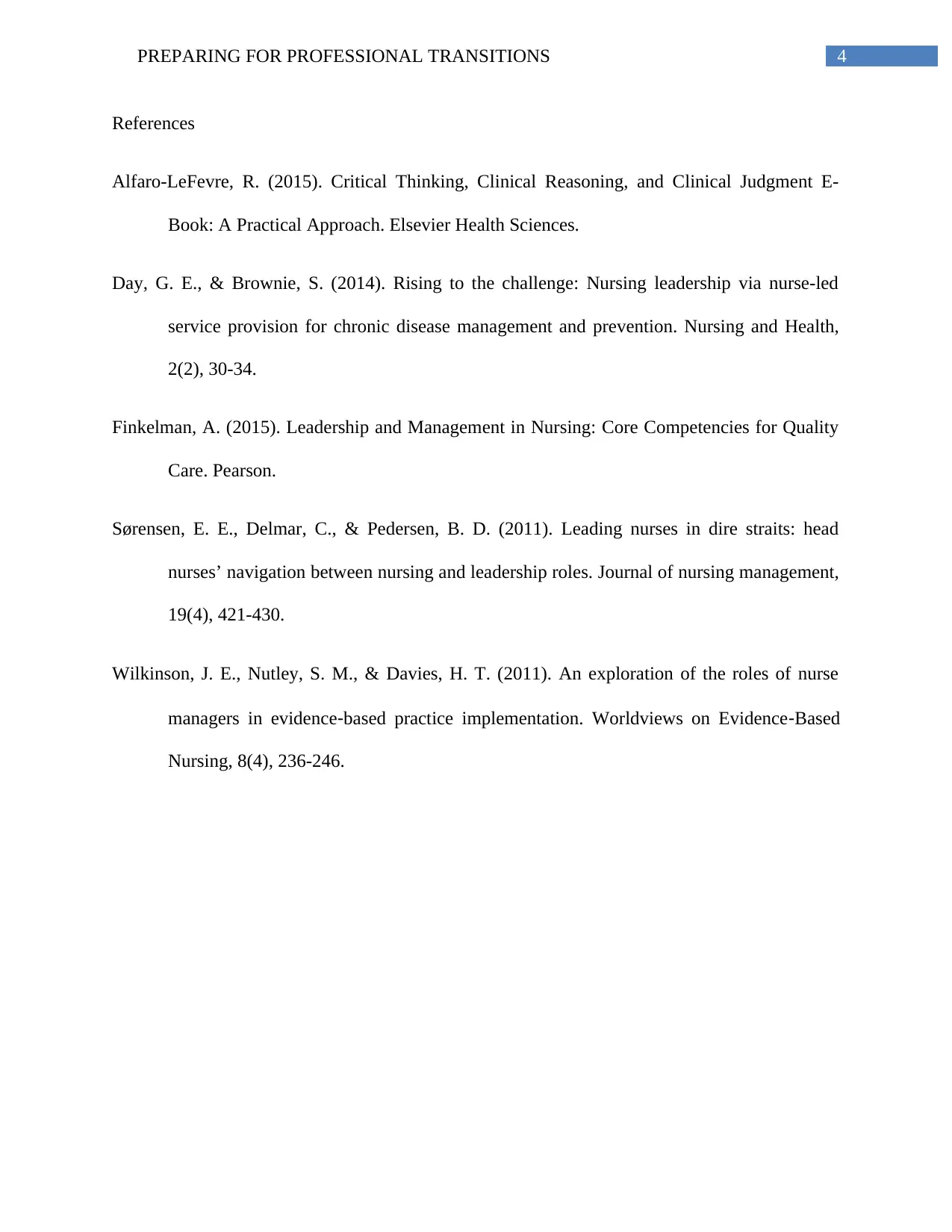
4PREPARING FOR PROFESSIONAL TRANSITIONS
References
Alfaro-LeFevre, R. (2015). Critical Thinking, Clinical Reasoning, and Clinical Judgment E-
Book: A Practical Approach. Elsevier Health Sciences.
Day, G. E., & Brownie, S. (2014). Rising to the challenge: Nursing leadership via nurse-led
service provision for chronic disease management and prevention. Nursing and Health,
2(2), 30-34.
Finkelman, A. (2015). Leadership and Management in Nursing: Core Competencies for Quality
Care. Pearson.
Sørensen, E. E., Delmar, C., & Pedersen, B. D. (2011). Leading nurses in dire straits: head
nurses’ navigation between nursing and leadership roles. Journal of nursing management,
19(4), 421-430.
Wilkinson, J. E., Nutley, S. M., & Davies, H. T. (2011). An exploration of the roles of nurse
managers in evidence‐based practice implementation. Worldviews on Evidence‐Based
Nursing, 8(4), 236-246.
References
Alfaro-LeFevre, R. (2015). Critical Thinking, Clinical Reasoning, and Clinical Judgment E-
Book: A Practical Approach. Elsevier Health Sciences.
Day, G. E., & Brownie, S. (2014). Rising to the challenge: Nursing leadership via nurse-led
service provision for chronic disease management and prevention. Nursing and Health,
2(2), 30-34.
Finkelman, A. (2015). Leadership and Management in Nursing: Core Competencies for Quality
Care. Pearson.
Sørensen, E. E., Delmar, C., & Pedersen, B. D. (2011). Leading nurses in dire straits: head
nurses’ navigation between nursing and leadership roles. Journal of nursing management,
19(4), 421-430.
Wilkinson, J. E., Nutley, S. M., & Davies, H. T. (2011). An exploration of the roles of nurse
managers in evidence‐based practice implementation. Worldviews on Evidence‐Based
Nursing, 8(4), 236-246.
1 out of 5
Related Documents
Your All-in-One AI-Powered Toolkit for Academic Success.
+13062052269
info@desklib.com
Available 24*7 on WhatsApp / Email
![[object Object]](/_next/static/media/star-bottom.7253800d.svg)
Unlock your academic potential
Copyright © 2020–2026 A2Z Services. All Rights Reserved. Developed and managed by ZUCOL.





